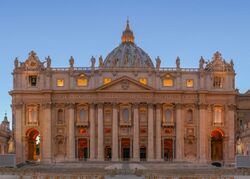Catholic moral theology
Topic: Philosophy
 From HandWiki - Reading time: 9 min
From HandWiki - Reading time: 9 min
| Part of a series on the |
| Catholic Church |
|---|
 |
| Overview |
| Part of a series on |
| Catholic philosophy |
|---|
   |
| Ethics |
| Schools |
| Philosophers |
Catholic moral theology is a major category of doctrine in the Catholic Church, equivalent to a religious ethics. Moral theology encompasses Roman Catholic social teaching, Catholic medical ethics, sexual ethics, and various doctrines on individual moral virtue and moral theory. It can be distinguished as dealing with "how one is to act", in contrast to dogmatic theology which proposes "what one is to believe".
Description
Sources of Catholic moral theology include both the Old Testament and the New Testament, and philosophical ethics such as natural law that are seen as compatible with Catholic doctrine. Moral theology was mostly undifferentiated from theology in general during the patristic era, and is found in the homilies, letters and commentaries on Scripture of the early Church fathers. During the Middle Ages, moral theology developed in precision and scope through scholasticism. Much of the Catholic Church's current moral theology, especially regarding natural law, is based in the Summa Theologica by St. Thomas Aquinas, which is regarded as one of the best treatises of Catholic moral theology.[1]
Contemporary Catholic moral theology is developed by acts of the Magisterium, by the Pope, other bishops, and by the works of lay Catholic moral theologians, which include magisterial teachings, as well as (in some matters) theological opinions. Examples of Catholic moral theologians include St. Alphonsus Liguori (author of Moral Theology), Germain Grisez (author of The Way of the Lord Jesus) and John Finnis (author of Natural Law and Natural Rights). Moral theology tends to be advanced most authoritatively through official statements of doctrine, such as papal encyclicals, which are based on the dogmatic pronouncements of Ecumenical Councils (e.g., Vatican II), Sacred Scriptures, and Sacred Tradition. In addition, moral theologians publish their own works and write in a variety of journals devoted in whole, or in part to moral theology. These scholarly journals are helpful in making the theology of the Church more clear and accessible to others, and serve as a forum in which scholarly discussion of understanding and application of issues occurs. However, these journals per se do not add or remove anything from Catholic teaching.
The curriculum for formation of priests commonly includes required and elective courses in Catholic moral theology.
Approaches to Catholic moral theology
- In a deontological approach, morality takes the form of a studying of "how one is to act" in relation to the laws established by the faith.
- In a teleological approach, "how one is to act" is related to the ultimate end which is again established by the faith.
- In a dialogical approach, morality follows the pattern of faith directly, the "how one is to act" is related to an encounter with God through faith.[2] Moral living is response to the Logos or Word of God. "Faith in the Logos...understands moral values as responsibility, as a response to the Word, and thus gives them their intelligibility as well as their essential orientation." [3]
See also
- Catholic teachings on sexual morality
- Catholicism
- Christian theology
- Ten Commandments in Roman Catholicism
- Traditionalist Catholic
References
- ↑ Lehmkuhl, Augustinus. "Moral Theology." The Catholic Encyclopedia. Vol. 14. New York: Robert Appleton Company, 1912. 26 May 2019 <http://www.newadvent.org/cathen/14601a.htm>.
- ↑ Bernhard Häring, Free and faithful in Christ. Moral Theology for priests and laity, I/General Moral Theology. For freedom Christ has set us free (Gal 5,1), Slough 1978, focus on chapter 3
- ↑ Ratzinger, Joseph Cardinal (Pope Benedict XVI). Introduction To Christianity, 2nd Edition (Communio Books) (Kindle Locations 304-306). Ignatius Press.
 KSF
KSF
